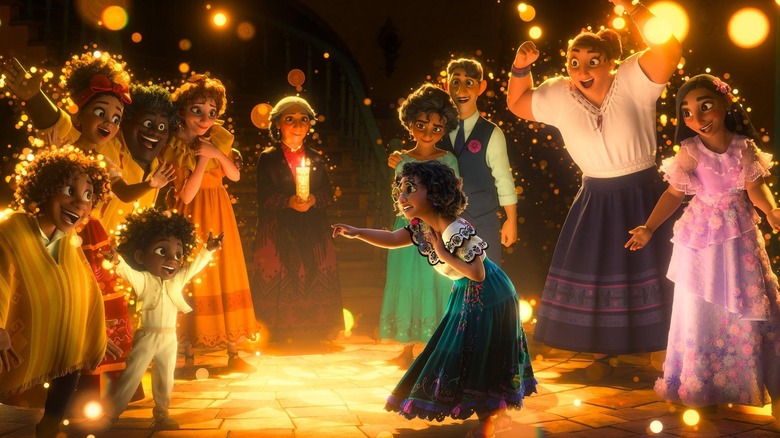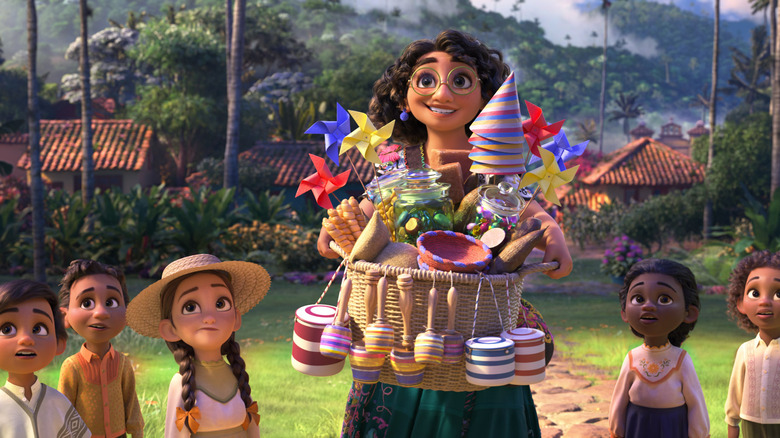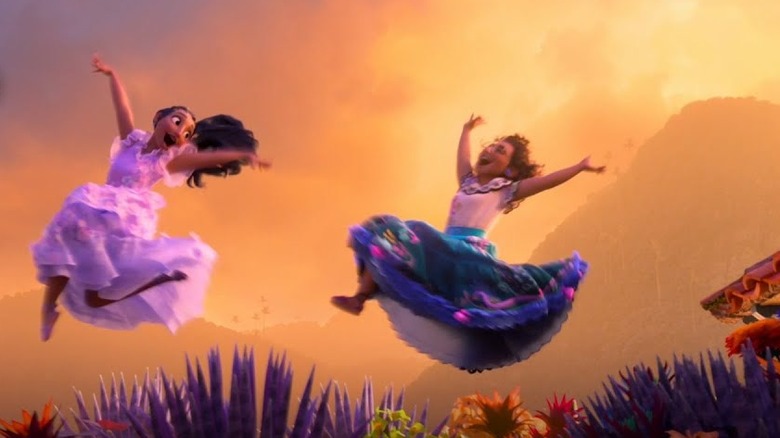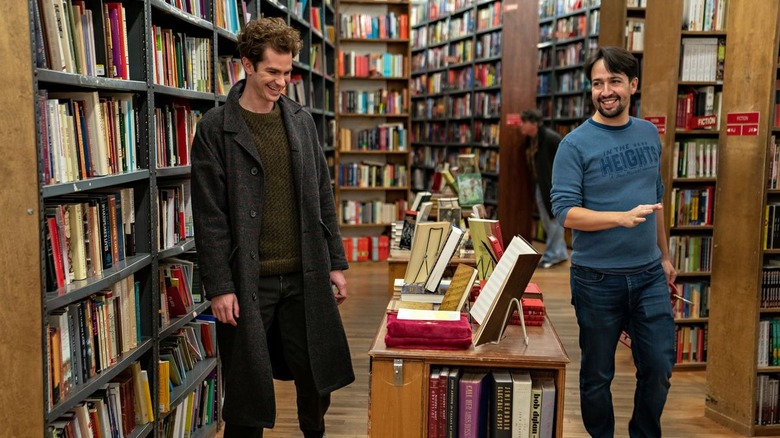Encanto Songwriter Lin-Manuel Miranda On Why Animation Is The Perfect Medium For Musicals [Interview]
Lin-Manuel Miranda is just happy to have a seat at the table. What does it matter that he's won every major award except an Oscar, and has been heralded as one of the best musical talents of our time? It doesn't make it any less humbling for him to pen the songs for a Disney musical. Even if this is his second one.
"I had a wonderful time working on 'Moana,'" Miranda told me in an interview with /Film ahead of the release of "Encanto," the Colombia-set fantasy musical film coming to theaters this Thankgsiving holiday. "It was a dream come true to write songs for Disney animated film."
But Miranda is a Disney fanboy to his core, and one film wasn't enough. He went to Walt Disney Music president Tom MacDougall to request to do the music for the "next one." That ended up being "Encanto."
That Miranda is writing the songs for yet another culturally diverse Disney animated musical doesn't escape his attention ("I don't know why," he chuckled), but he's glad to be writing for a film so steeped in Colombian culture, after last having a go with the Polynesian-inspired soundtrack of "Moana."
"[It] was fun for me as someone with roots in Puerto Rico and Mexico to dive into this other country. It was sort of like going to your cousin's house," Miranda said.
I chatted with Miranda about what it is about animation that lends itself so well to the musical, how he learned his best songwriting lessons from a Howard Ashman DVD, and the challenges of adapting musicals to the screen with his own directorial debut, "Tick, Tick... BOOM!"
"The pressure doesn't go away, you know your work is going on a playlist with some of the greatest movie music of all time."
This is your second Disney musical for which you wrote and compose the songs. What brought you back and was there pressure to surpass songs that you wrote for "Moana"?
There's pressure any time you're working for Disney, not because of "Moana," but because of "The Little Mermaid" and "Beauty and the Beast" and "Snow White" and "Pinocchio" and the "Lion King." Yeah but basically, I had a wonderful time working on "Moana." It was a dream come true to write songs for Disney animated film. "The Little Mermaid" is what exploded my brain when I was nine years old and really made me fall in love with musical theater, musical storytelling.
And so I sort of, when that went well, I asked my boss, Tom MacDougall who runs music for Disney, "Can I just be in on the ground floor of the next one?" Because when I was hired for "Moana," it was already several years in development. So I just really wanted to be there from the beginning and was very happy to be there. But the pressure doesn't go away, you know your work is going on a playlist with some of the greatest movie music of all time. And so, you have to actually put that out of your head and just focus on your characters and telling the story while you're writing.
So how did you approach the songs for "Encanto" differently than the songs from "Moana"? Were there any specific Colombian musical characteristics or flares that you brought into the songs, for example?
Yeah, I always say the two things that you bring with you to every project are research and empathy. Those are the tools you're going to use the most while you're making the thing. A couple of things, one, because I was there early in the process, I knew that the thing we were all trying to get our arms around, Byron and Charise and Jared and I, was to really tell the story of a family.
A lot of times when you're making a movie, you kind of cut out the characters you don't need because you've got a main character and they've got a journey, but we wanted the family to be the main character. We wanted the dynamics and how they change and evolve or get stuck to actually be the story, that's complicated enough. Anyone who has grown up in a family and has had to try to individuate from their family and has a tension between how they see themselves and how their family sees them. That was the meaty stuff we wanted to write about and capture.
And then when we settled on Colombia as the setting, we just dove into research. We flew down there, we stayed there for two weeks, we listened to musicians. It was fun for me as someone with roots in Puerto Rico and Mexico to dive into this other country. It was sort of like going to your cousin's house. You see there's ways in which your music is similar, but there's ways in which those rhythms diverge and the instruments that play those melodies diverge.
So to that end, the opening number, I think for the first time in a Disney movie is this like accordion centric Latin tune, because that's such a linchpin in Colombian music. But beginning to end, just like using Colombian instruments, Colombian rhythms and forms, that was really fun. And again is what makes the specificity of the work sort of really land.
"Animation can move at the speed of thought in a way something on stage can't."
So, all right, this might sound like a strange question, but what is it about your songwriting style that is making you Disney's go to songwriter for culturally diverse animated musicals?
Oh, I'm just happy I get invited to the dance at all. I don't know. I know that when I was interviewed for "Moana," I was one among many songwriters and I was being interviewed by Ron and John, who directed the movie that made me fall in love with this form. And I sat down and I said, "I'm here because of you, I'm here because of your movie." And I was so lucky to get brought along for that journey, but the truth is it's also really exciting.
I'm very close with Bobby and Kristen Anderson-Lopez too. Bobby and I went to the same elementary school and high school and had the same amazing music teacher, Barbara Ames, who set us off in this direction when we were too young to even realize it. And so, the fact that I can call them and commiserate on this stuff when I'm stuck on a song for Mirabel, that I have someone who actually really knows what they're doing in this incredible songwriting team is what makes it really, really rewarding.
That I've become... That I've gotten to know the folks who are the best at this, whether it's calling Alan Menken and working with him or calling Bobby and Kristen. Just like, I feel like the little brother of the club who like occasionally gets a song on the board. It makes me very grateful to be here.
So you've worked on both the live-action and animated side of musicals. There's been a surge in musical adaptations recently in both live-action and animation, some maybe more successful than others. What do you think it is about animation specifically that lends itself to the earnestness that is inherent in the musical form?
Oh, I would need so much longer than the nine minutes we have. But I'll tell you, when I first started working on "Moana," one of the first things I did was I got a... I was behind the scenes over at Disney animation. I got this incredible DVD of Howard Ashman basically holding a class on musical theater storytelling for all of the Disney animators that working on the movie. And he went beat by beat through "Little Mermaid" and why this song is here and why it matters and why we're going on it. "We're going to establish the world of fathoms below and we're going to go from above the world that we know down below the world. And that's how we're going to musically intro..."
I learned more from that hour-long DVD than anything, because more than anything, animation can move at the speed of thought in a way something on stage can't. You see it in this movie, I wrote this song "Surface Pressure" for Louisa and I'm in my corner of the world writing rhymes for the word nervous. "Nervous, Cerberus, have they seen how big the iceberg is?"
But then the animators take that and they just let their imagination go wild with it and cut to me watching this incredible number. And we are going to all of the places the lyrics go to, which is really free associative, but animation can move at the speed of free association. It can go anywhere and in any direction. And so, it's really thrilling for a songwriter because what comes back to you is so much more than you could have imagined.
"You have to find a way in that makes it feel organic and real."
And you make your own directorial debut adapting "Tick, Tick ...BOOM!" in live-action. Do you think you can speak as to why some filmmakers may have found challenges when translating hit musicals to the big screen?
I don't know who has or who hasn't. I know that it is the hardest thing you can do, because when you walk into a theater to see a live musical on stage you know that it's what you're paying for. You're like, all right, these guys are going to break a song, let's see it. But when the camera is here and it looks like real life, the threshold to burst into song is trickier.
You have to find a way in that makes it feel organic and real. And you have to set up the rules and you have to stick to them and the best filmmakers really know how to do that. I'm thinking of Bob Fosse, I'm thinking of Rob Marshall. I think of John Chu's incredible work on "Heights." I think the way he set up that musical world with the percussion of the neighborhood is so incredible.
But I mean, there's several issues, it's you're taking a two-act thing and turning it into a three-act structure. For me, the fun of "Tick, Tick, ...Boom!" is that there is no definitive version. Jonathan Larson used to perform it as a rock monologue in 1990 and I have all of the different drafts of just that. Then there was a posthumous off-Broadway version that was designed for three actors. And that's the version I saw in my senior year in college that blew my mind.
And so, in making the film we really kind of opened up all the drafts and said what can we take from all of this that makes for the best movie? It can't be what's on stage, there is no definitive onstage version. I think we had a real advantage in "Tick, Tick ...BOOM!" because we had a lot of working drafts to pick and choose for our movie.
"Encanto" opens in theaters on November 24, 2021.



